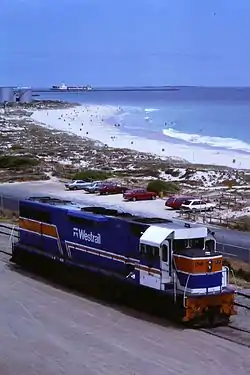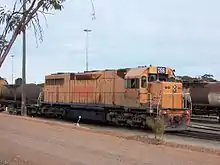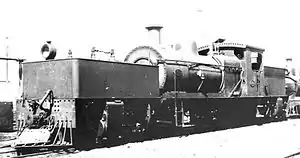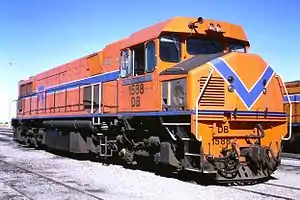| Western Australian Government Railways L Class | |||||||||||||||||||||||||||||||||||
|---|---|---|---|---|---|---|---|---|---|---|---|---|---|---|---|---|---|---|---|---|---|---|---|---|---|---|---|---|---|---|---|---|---|---|---|
 L270 in a promotional photo for the Indian Pacific, 1970. | |||||||||||||||||||||||||||||||||||
| |||||||||||||||||||||||||||||||||||
| |||||||||||||||||||||||||||||||||||
| |||||||||||||||||||||||||||||||||||
| |||||||||||||||||||||||||||||||||||
The L Class are a class of diesel locomotives built by Clyde Engineering, Granville and Eagle Farm, and Commonwealth Engineering (subcontracted by Clyde), Rocklea for the Western Australian Government Railways between 1967 and 1973.
History
With the 657-kilometre (408 mi) Eastern Goldfields Railway between Perth and Kalgoorlie being converted to standard gauge, the Western Australian Government Railways started to take delivery of 23 Electro Motive Diesel GT26C locomotives from Clyde Engineering in October 1967.[1] The design was based on the EMD SD40 reduced in height to fit within the Australian loading gauge. At the time they were comfortably the largest and heaviest diesel locomotive operated by a government operator.[2]
All were delivered from Sydney via Melbourne and Adelaide, necessitating them being placed on broad gauge bogies for the journey between Dynon and Port Pirie.[2]
They entered service hauling iron ore trains from Koolyanobbing to Kwinana and the Indian Pacific. However they were quickly removed from passenger trains after it was realised the damage they could cause to the track at higher speeds.[2]
In 1972, Comalco purchased two locomotives of the same design for use on its 19.5-kilometre (12.1 mi) line at its bauxite mine in Weipa. These were built with an extra 11 tonnes (11 long tons; 12 short tons) of ballast for increased adhesion. In 1973, the Western Australian Government Railways took delivery of a further two, funded by Western Mining Corporation as part of the building of a nickel mine at Mount Windarra. The Comalco locomotives were built by Clyde Engineering's Eagle Farm factory, and the WMC funded locomotives were built under subcontract by Commonwealth Engineering at their Rocklea plant.[2][3]

In 1983, three were leased to V/Line to haul services on the standard gauge Melbourne to Albury line.[4] One even operated through to Sydney in May 1984.[5]
In 1994, following the purchase of GML10, Comalco's R1.001 was sent to Clyde Engineering, Kelso for overhaul.[6] Upon its return in August 1994, R1.002 was sold to Westrail and placed in service as Lw276.[2]
Following the delivery of the Q class locomotives in 1997, many were withdrawn with those remaining in service relegated to trailing locomotive status.[7]
In July 1998, seven were sold to Australian Transport Network. After being overhauled by National Railway Equipment Company, Whyalla, four were placed in service by ATN Access hauling grain trains in southern New South Wales and Victoria. Three were included in the sale of Australian Transport Network to Pacific National in February 2004 while the fourth along with the three unused examples along with one of the operational units were sold to Rail Technical Services, Dynon who resold them to QR National subsidiaries Interail and Australian Railroad Group for use in New South Wales.[2]

The remainder were included in the sale of Westrail to Australian Railroad Group in December 2000. All were included in the sale of Australian Railroad Group's Western Australian operations to QR National in June 2006. After being stored for some years, the Pacific National-owned L's were scrapped in 2015.
All of the locomotives now under the control of Aurizon have been renumbered as the 3100 class.[8][9][10][11] Those fitted with Q-Tron traction control have had the "LQ" prefix applied, those with ZTR traction control "LZ". Some were transferred to New South Wales to haul trains from the Manildra Group's flour mills at Gunnedah, Manildra and Narrandera to Bomaderry from 2003 until 2008.[2]
In 2011, Comalco sold R1.001 to Australian Locolease who placed it in service as L277 and leased it to El Zorro to operate grain trains in Victoria. After several years of storage and irregular use, L277 was sold on to Southern Shorthaul Railroad in 2020 with the loco being transferred to Cootamundra for reactivation work. It was reactivated in September 2020.
In 2018, all Aurizon owned units were placed into long-term storage, future uncertain. LZ3111 hauled three sister units to Avon Yard on train 6111 on the 12th January that year before returning light engine as train 6112 back to Forrestfield.
In 2021, Aurizon reactivated LZ3119 and LZ3120 for use on grain trains in New South Wales. After spending a year and a half there, LZ3120 was transferred back to Western Australia in December 2022.
Models of the L Class have been produced in HO scale by two companies: Haskell Co Taiwan and Southern Rail Models.
Disposition
| Key: | In Service | Withdrawn | Preserved | Converted | Stored | Scrapped |
|---|
| Serial number | Entered Service | Original Road Number | Renumbered As | Name | Current/Last Owner | Livery | Status | Ice Radio Fitted |
|---|---|---|---|---|---|---|---|---|
| 67-541 | 30 October 1967 | L251 | - | Thunderbird 1 | Pacific National | PN Blue & Yellow | Scrapped, 5 May 2015 (Werris Creek) | N/A |
| 67-542 | November 1967 | L252 | LZ3101 | Kurra Kurraka | Aurizon | Aurizon Pineapple with QR logos | Scrapped, June 2016 (Casino) | N/A |
| 67-543 | December 1967 | L253 | LZ3119 | - | Aurizon | ARG Orange With Aurizon Logos | Reactivated for NSW grain traffic, July 2021, Stored East Greta | Yes |
| 67-544 | January 1968 | L254 | - | Enterprise NCC 1701 | Pacific National | ATN Yellow & Burgundy | Scrapped after an engine fire, 4 November 2016 (Cardiff Locomotive Workshops) | N/A |
| 67-545 | February 1968 | L255 | LZ3105 | - | Aurizon | ASR Orange & Black with ARG logos | Stored, October 2014 (Avon Yard) | No |
| 67-546 | March 1968 | L256 | LZ3106 | - | Aurizon | Aurizon Pineapple with QR logos | Stored,(West Kalgoorlie) | Yes |
| 68-547 | March 1968 | L257 | 3102 | Wagiman | J&P Metals | ASR Orange & Black with ARG logos | Scrapped, 30 October 2021[12] | N/A |
| 68-548 | March 1968 | L258 | LZ3107 | - | Aurizon | ASR Orange & Black with ARG logos | Stored, January 2018 (Forrestfield) | bgcolor= |
| 68-549 | April 1968 | L259 | LZ3103 | Aboriginal Stockman | Aurizon | Aurizon Pineapple | Stored (Avon Yard) | |
| 68-550 | May 1968 | L260 | L3108 | - | Aurizon | Westrail Yellow & Blue | Stored, October 2014 (Avon Yard) | |
| 68-551 | August 1968 | L261 | LZ3109 | - | Aurizon | ARG Orange | Undergoing overhaul at Progress Rail, Port Augusta, December 2022 | |
| 68-552 | August 1968 | L262 | L3110 | - | Aurizon | ASR Orange & Black with ARG logos | Stored (Forrestfield) | |
| 68-553 | October 1968 | L263 | LZ3111 | - | Aurizon | ASR Orange & Black with ARG logos | Reactivated July 2023 | |
| 68-554 | October 1968 | L264 | LZ3112 | - | Aurizon | ARG Mustard & Burgundy | Stored, 12 January 2018 (Avon Yard) | |
| 68-555 | October 1968 | L265 | LQ3121 | Shoalhaven | Aurizon | ARG Mustard & Burgundy | Stored (Avon Yard) | |
| 68-556 | October 1968 | L266 | L3113 | - | Aurizon | Westrail Orange & Blue | Stored (Avon Yard) | |
| 68-557 | November 1968 | L267 | LZ3114 | - | Aurizon | ARG Orange | Undergoing overhaul at Progress Rail, Port Augusta, December 2022 | |
| 68-617 | December 1968 | L268 | L3115 | - | Aurizon | Westrail Yellow & Blue with ARG logos | Stored (Avon Yard) | |
| 68-618 | January 1969 | L269 | - | - | Westrail | Westrail Orange & Blue | Involved in a crossing accident on 30 May 1995. Scrapped, February 1996 | |
| 68-619 | March 1969 | L270 | - | Red Dwarf | Pacific National | Pacific National Blue & Yellow | Scrapped, 5 May 2015 (Werris Creek) | |
| 69-620 | April 1969 | L271 | LQ3122 | John Douglas Kerr | Aurizon | QR Interail | Scrapped, June 2016 (Casino) | |
| 69-621 | May 1969 | L272 | L3116 | - | Aurizon | Westrail Orange & Blue | Stored (Avon Yard) | |
| 69-622 | June 1969 | L273 | LZ3104 | Purnu | Aurizon | ASR Orange & Black with ARG logos | Scrapped, June 2016 (Casino) | |
| 72-752 | January 1972 | R1.001 | L277 | Phoenix | Southern Shorthaul Railroad | Comalco Two-Tone Orange with SSR Logos | Reactivated, September 2020. | |
| 72-753 | January 1972 | R1.002 | Lw276, LZ3120 | - | Aurizon | ARG Orange With Aurizon Logos | Reactivated for NSW grain traffic in July 2021 then returned to WA in December 2022 | |
| 73-779 | September 1973 | L274 | LZ3117 | - | Aurizon | ASR Orange & Black with ARG logos | Stored, 12 January 2018 (Avon Yard) | |
| 73-780 | October 1973 | L275 | L3118 | - | Aurizon | Westrail Orange & Blue with ARG logos | Stored, October 2014 (Avon Yard) |
References
- ↑ "20 Years Ago" Railway Digest October 1987 page 332
- 1 2 3 4 5 6 7 Oberg, Leon (2010). Locomotives of Australia 1850s-2010s. Kenthurst: Rosenberg Publishing. pp. 346–348. ISBN 9781921719011.
- ↑ Dunn, John (2013). A History of Commonwealth Engineering Volume 3: 1966-1977. Kenthurst: Rosenberg Publishing. p. 313. ISBN 9781877058905.
- ↑ "Locomotives and Traffic" Railway Digest January 1985 page 12
- ↑ Railway Digest July 1984 page 247
- ↑ Railway Digest September 1994 page 8
- ↑ "The L Class Locomotives of WA" Railway Digest August 2000 page 18
- ↑ L Class (WAGR) Archived 8 February 2015 at the Wayback Machine Railpage
- ↑ LQ Class Archived 8 February 2015 at the Wayback Machine Railpage
- ↑ LZ Class Archived 8 February 2015 at the Wayback Machine Railpage
- ↑ L Class Archived 29 August 2016 at the Wayback Machine Vicsig
- ↑ "LZ3102 J&P scrapyard Picton East". 30 October 2021. Archived from the original on 26 November 2021. Retrieved 26 November 2021.
- Gunzburg, Adrian (1968). WAGR Locomotives 1940–1968. Perth: Australian Railway Historical Society (Western Australian Division). pp. 45–46, 50. OCLC 219836193.
- Australia Wide Fleet List Motive Power issue 96 November 2014 pages 65, 69
External links
![]() Media related to WAGR L class (diesel) at Wikimedia Commons
Media related to WAGR L class (diesel) at Wikimedia Commons


